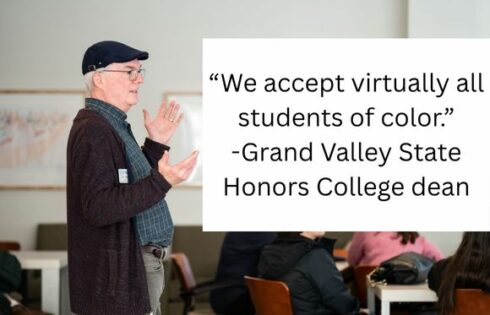
Jewish advocacy groups call on administrators to ‘take action’
One in three Jewish students report that faculty promote antisemitism or “learning environments hostile to Jews” on U.S. campuses, a recent Hillel International and American Jewish Committee poll revealed.
The AJC report describes a “troubling trend” of distrust that Jewish students feel toward faculty. However, one free speech expert shared his concerns about censorship with The College Fix in response to the group’s call to crack down on “hate” and “bigotry.”
The global Jewish advocacy organization reported that students are not convinced that faculty will “foster the educational environments they deserve – free from anti-Jewish and anti-Israel bias.”
“If students feel that they need to just keep their head down and earn their grade, they are not fully participating in the educational experience that they have a right to and deserve,” ACJ’s leader, Ted Deutch, stated in the news release.
“Educators and administrators need to take action to ensure that their classrooms and campuses are places free from hate, bigotry, and harassment so that all students – including Jewish, Israeli, and Zionist students – have the opportunity to grow and thrive,” he said.
Similarly, Hillel International CEO Adam Lehman said Jewish teens and their families need assurance of safety and the freedom to “fully express their Jewish identities” when choosing a college.
The Fix reached out to AJC and Hillel twice via email and once via phone call in the last two weeks to ask how universities should respond to the study and how it should impact free speech on campus. Neither responded.
Offering another perspective, Foundation for Individual Rights and Expression Program Officers Aaron Corpora warned that universities should be careful not to engage in censorship.
“Public universities, bound by the First Amendment, cannot punish expression simply deemed ‘anti-Semitic,’ so long as the content does not fall into a clearly defined category of unprotected speech such as incitement, true threats, or defamation,” Corpora said.
These categorical exceptions to the First Amendment are few, narrow, and carefully defined. To protect freedom of expression, they must remain that way, he said.
Further, “Private universities are not bound by the First Amendment, but typically make promises of free speech in their handbooks that are tantamount to First Amendment protection.”
Corpora said both universities and the federal government have tried to apply the International Holocaust Remembrance Alliance’s definition of antisemitism to enforce campus anti-discrimination laws.
However, this definition was not designed for legal use and “covers a broad range of expression that the First Amendment protects,” he said.
He also told The Fix his advocacy group, the Foundation for Individual Rights and Expression, has seen more “censorship against pro-Palestine viewpoints than pro-Israel.”
Asked how the AJC and Hillel study relates to previous free speech cases, Corpora said, “Since Oct. 7, 2023, FIRE has received almost 450 case submissions revolving around expression related to the Israel/Hamas war, subsequent protests, de-platformings, shoutdowns, student media censorship, and more.”
“Of those hundreds of cases, we’ve more often seen censorship against pro-Palestine viewpoints than pro-Israel, but both sides have been guilty of trying to wield censorship to stop speech they disapprove of,” he said.
The Fix also reached out to Students Supporting Israel and the Anti-Defamation League twice via email for comment in the last two weeks. SSI did not respond. ADL did not comment on the AJC and Hillel joint study, but referred The Fix to its own related study called Campus Anti-Semitism Report Card.
This study assigned grades to institutions of higher education based on thirty different criteria divided into three categories: Publicly Disclosed Administrative Actions, Jewish Life on Campus, and Campus Conduct and Climate Concerns.
Of the 135 schools that were assessed, 41 received an “F” or “D” grade while 49 schools received an “A” or “B.”
The group conducted the study by distributing surveys among students and on-campus Hillel representatives and researching reported incidents.
MORE: U. Washington affirms commitment to ending antisemitism
IMAGE CAPTION AND CREDIT: Jewish student sitting in classroom; Alleksander/Shutterstock
Like The College Fix on Facebook / Follow us on Twitter






Please join the conversation about our stories on Facebook, Twitter, Instagram, Reddit, MeWe, Rumble, Gab, Minds and Gettr.